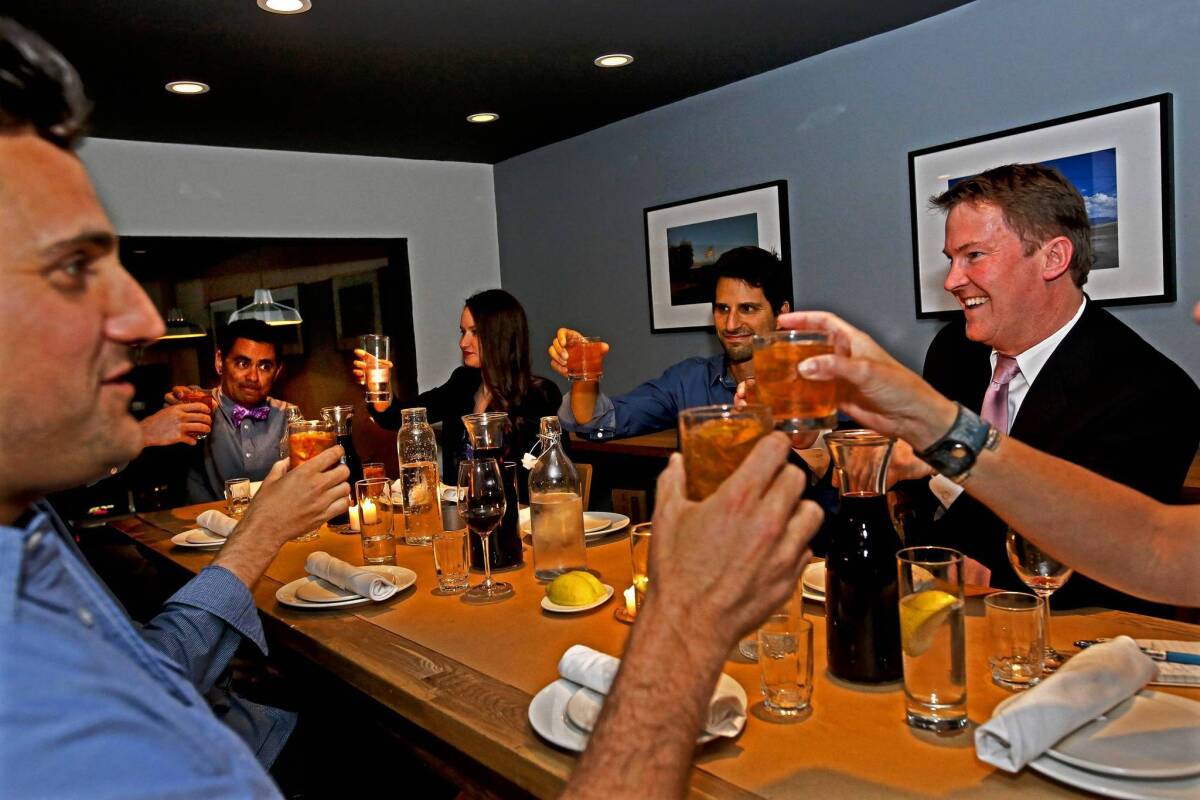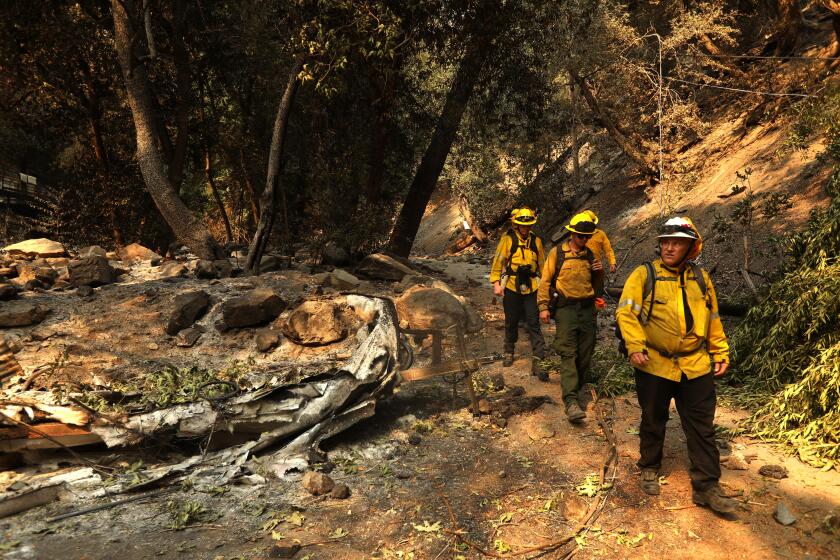At a salon on Melrose, flowing wine and food for thought

Six men and two women sit down to a simple dinner around a rectangular table in a glassed-in upstairs room at Osteria la Buca. It’s 7:30 on a Tuesday night in spring, and the sun is just barely sinking into the city haze, leaving Melrose Avenue awash in dirty pink and gold light. The guests — all strangers — have arrived to take part in a new dinner series called the Salon at Osteria la Buca. They have been picked by the restaurant to participate based upon recommendations from previous guests and RSVP letters they composed outlining their professional accomplishments and personal philosophies.
They are fed a family-style dinner. It consists of homemade pasta and meatballs, salad with Parmesan, warm bread with rosemary and olive oil, tiramisu and unlimited red wine. The idea is to create a relaxed space for the free exchange of ideas, whether they be political, philosophical or romantic. There is no end game and no set time for the dinner to conclude. How long the conversation goes, and where it travels, depends entirely on the guests (and how much wine they choose to drink). It’s invitation only, but the cost of the dinner is picked up by the restaurant.
“We had this idea of putting people from different industries together in the same room and seeing what they could make of it,” says Stephen Sakulsky, who came up with the idea alongside the restaurant’s owner, Graham Snyder. “L.A. gets such a bad rap for anti-intellectualism.”
Most famous salons, including the literary and art salon that Gertrude Stein held at 27 rue de Fleurus in Paris, and the Hollywood A-lister salon that the once all-powerful talent agent Sue Mengers held at her Beverly Hills home, were defined by a charismatic host who curated fascinating guests and guided conversation. In the absence of such a leader, the Salon at Osteria la Buca plays out a bit more like a game of Clue, with guests introducing themselves and stating what they would do to make Los Angeles a better place.
Nerves are jangled at the most recent dinner, the second, but a pre-game old-fashioned cocktail soon calms everyone down. The group includes conservative L.A. mayoral candidate Kevin James (who came in third in the race); Joe Moller, the feisty head of Downtown Los Angeles Art Walk; Mike Dow, a writer for the TV Land sitcom “Happily Divorced,” which stars Fran Drescher (Drescher was a former salon guest and extended her invitation to Dow); DJ Casey Alva, who has worked in the music industry for 20 years; freelance film producer Jocelyn Webber; architect Ben Luddy, who owns a design practice called Scout Regalia; and a businessman who requested anonymity due to the delicate nature of the business he conducts.
Moller kicks off the conversation by suggesting a cellphone siesta from 6 to 7:30 p.m. every day in Los Angeles.
“Everyone would just come home and go off the grid,” he says, absent-mindedly taking his iPhone out of his pocket to snap a picture of the salad.
“I’m not trying to change the world; I’m just trying to make people happy through music,” says Alva who wears a dapper bow tie and sits at the head of the table.
“I’ve always had this idea that if you charged a flat rate for taxi cabs from 9 p.m. to 2 a.m., it would change the landscape of the city and how it operates,” says Dow.
The attention soon switches to James, who says that he tried to make L.A. a better place by running for mayor.
“In politics we’re never ones to shy away from stealing good ideas,” James says. “If I had known about that taxi cab one, I would have used it in the debates.”
As the carafes of wine on the table reach half mast, the conversation flows more smoothly, and for the most part it veers away from small talk, which is refreshing.
Alva discusses the perils of being openly gay while in Singapore; Webber laments the lack of money available for the makers of short films; James talks about why he decided to endorse Eric Garcetti over Wendy Greuel; Dow explains the importance of execution and follow-through when it comes to writing in Hollywood; and Luddy gets excited about CicLAvia and the promise of a burgeoning bike culture in the city.
“My company designed these cruisers — they’re like the slow food of bikes,” he says as coffee and dessert is brought in.
“For a culture so defined by the hood ornaments on our cars — to move away from that and engage in cycling is a huge sociological shift,” says Moller.
James nods, “When it comes to public transportation, connectivity is our great problem.”
Around 11 p.m., the group begins to disperse, shaking hands and putting napkins on top of empty plates. Phones come out of pockets as guests check in on the details of daily life that they had left at the restaurant door. Taking time out for thoughtful discussion had been a relief, but it was the food, after all, that made the conversation possible, and the table itself that served as the consummate host.
Sign up for The Wild
We’ll help you find the best places to hike, bike and run, as well as the perfect silent spots for meditation and yoga.
You may occasionally receive promotional content from the Los Angeles Times.




